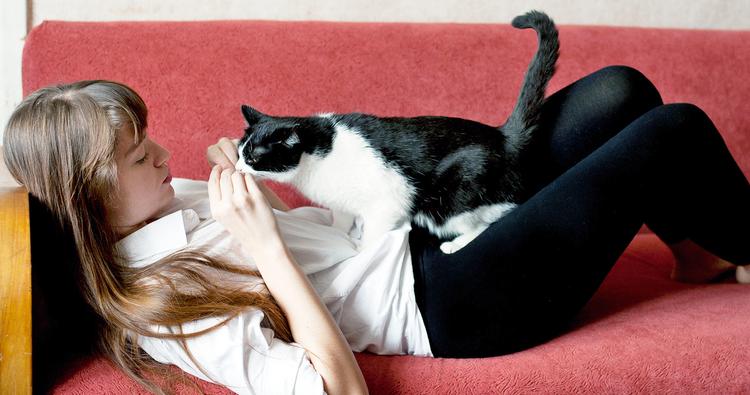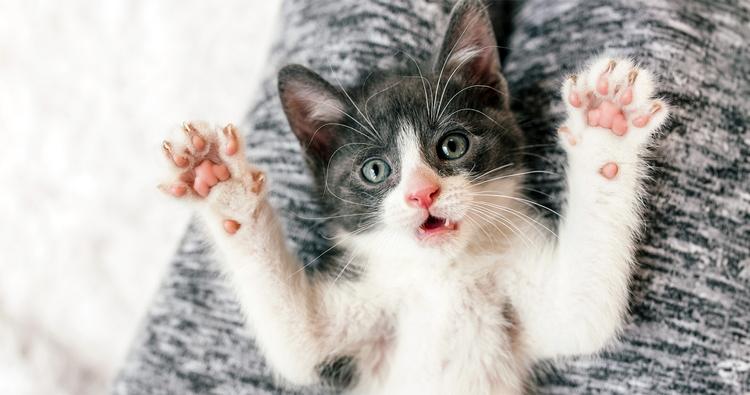Here’s Why You Should Adopt a Black Cat
Here’s a primer on the cultural history of black cats, why they look the way they do, and how to celebrate Black Cat Awareness Month.
Here’s a primer on the cultural history of black cats, why they look the way they do, and how to celebrate Black Cat Awareness Month.
by Nisha Gopalan, | October 2, 2024

Ibex.media / Stocksy
October is Black Cat Awareness Month. Aside from the obvious noir-kitty/Halloween connection, it’s an important reminder of their baffling outsider status, even among cat lovers. According to a much-quoted study by the National Library of Medicine, these felines have, by far, the highest rate of euthanasia (at 74.6 percent) and the lowest rate of adoption (at 10 percent) compared to cats of other colors. This should alarm all of us. Ever heard of black dog syndrome? It’s arguably worse for black cats. (Consider saving one of these harmless, enchanting little kitties.) But why is their appeal so polarizing?
Central to those startling statistics are the superstitions and biases that have haunted these cats for centuries. Passed on and on through generations, they’ve culminated in one overarching truth: Folks almost instinctively avoid these felines, even though myths about black cats have long been debunked. To quote the sarcastic, old-timey comedian Groucho Marx, implying that we need to cool it with the hate, “A black cat crossing your path signifies that the animal is going somewhere.”
Read on for more details about how black cats are actually quite special, as well as context on how humans have treated them throughout history.
Contrary to common misconceptions, black cats are not only beautiful but also have several distinctive traits that set them apart.
The contrast between a black cat’s lovely ebony coat and golden eyes is immediately striking. These cats produce a lot of melanin, which accounts for both their fur and iris colors. Interestingly, the gene responsible for the richness of their coat also means these cats (some studies estimate three-fourths of them) are more likely to be male.
Although they can, like any other cat, be curious, affectionate, and smart (personality varies by individual cat, of course), one survey from UC Berkeley found that they are mostly associated with being chill. These less extreme personality traits give them an air of mystery, which accounts for the bad rap they’ve gotten over the years. But despite this, they are enduring little kitties.
Black cats come with interesting evolutionary advantages. Research associated with the National Institutes of Health suggests that they are less prone to contracting diseases such as feline immunodeficiency virus (FIV). Other studies indicate they may even live longer than other felines. “Our results demonstrate that some ‘black cats’ are black not by chance, but by selection for a mutation that provides increased fitness,” one academic paper claims.
In the distant past, black cats were considered wonderfully auspicious. Black cats have served as symbols of wealth, wisdom, and protection for centuries.
The Egyptians revered all cats (including black ones) as signs of luck. Meanwhile, British and Irish sailors also valued them as bringers of good luck — their ability to keep ships mice-free only strengthened this sentiment. Chilean folklore celebrated them as treasure hunters.
In Scotland, simply seeing a black cat sitting in your doorway or on your porch signified that you will enjoy some unexpected wealth soon — no doubt the cat distribution system at work. And in Japan, they’ve long been considered bringers of prosperity. That positive association still endures, and there’s even a cat café in Himeji, Japan, devoted to these darker-hued felines.

Camilo Ospina / Pexels
Originally, black cats were cherished for their smart, mystical appeal. But that all changed during the Middle Ages, which kicked off a centuries-long feline dark age.
It’s the Greeks who arguably sparked the association of black cats with witchcraft. In classical mythology, Hecate, the goddess of magic and all things nocturnal, was often found accompanied by a black cat. Depending on whom you ask, she may have turned a helpless servant into this kitty. Either way, sable-color cats became wrongly associated with misfortune and sorcery.
By the Middle Ages, suspicion of black cats spread across Europe, with the Catholic Church linking them to pagan rituals. In 1233, Pope Gregory IX issued a decree (called the Vox in Rama) to denounce devil worship, accusing witches of hanging out with Satan disguised as a black cat. What resulted can only be described as the mass murder of cats instigated by religious fervor, which involved such extreme acts as burning cats and throwing them off towers. Also not helping: Cats, among other creatures, may have been Bubonic Plague carriers.
Fast-forward to the Puritans arriving on American shores and harboring a fear of felines representing paganism. During the Salem Witch Trials of the late 1600s, black cats were often killed alongside accused witches. Today, Salem has become synonymous with Halloween, and so has the celebration of once-persecuted witches and their black cats.
Still, as ridiculous as the old Christian fear of black cats may have seemed by the 20th century, negative connotations continued to torment these felines. During America’s Industrial Revolution, the black cat was used as a symbol of anarchists. Roughly 90 years later, the Chicago Cubs blamed their dismal 1969 season on the emergence of a black cat from beneath Shea Stadium onto the field. With all these adverse associations, these kitties remained symbols of suspicion, neglected in shelters and rescues.
For every Edgar Allen Poe tale that contemplates the nature of black cats (see his short story “Black Cat”), countless modern ones (among them Chilling Adventures of Sabrina, Star Trek, Sailor Moon, and Hocus Pocus) celebrate them. That’s for a good reason: They are pretty easygoing cats who, if you take the time to know them, defy all stereotypes. Here are four ways you can support black cats and promote their adoption.
The best way to celebrate this month is by adopting a black cat. These imminently loveable creatures have been dealt a bad hand over the years. Today, even though potential adopters aren’t exactly contemplating whether a black cat is good luck or bad luck, their unfair reputation, born of irrational human paranoia, greatly hurts their chances of adoption.
Because these are the least adopted and most euthanized felines, you’d be saving a life — and gaining a feline buddy. And that mutual, loving bond is pretty powerful.
Let’s say you’re curious about what it would be like to cohabitate with a black cat, or you aren’t in the position to make the long-term commitment to adopt. Why not try fostering one? It’s only temporary and a great way to become more acquainted with a black feline’s relaxed personality.
Because shelters and rescues are overcrowded, you’d be playing an integral part in taking some stress off that system. Additionally, cats who are brought into homes (even temporarily) learn important behaviors from their time in foster care, which can improve their chances of ultimately being adopted. And if you end up being a foster fail who grew attached to your kitty, we wouldn’t judge you at all.
Spending time as a cat shelter volunteer is a great way to help black cats in need and learn more about these beautiful felines. If you don’t have time to volunteer, donations to shelters or rescues are always welcome. This donation will help to provide food, shelter, and medical care for black cats in need.
There’s a reason why cat content is so popular in social media: Felines are packed with personality and endlessly entertaining. A black cat is certainly no exception.
Remind folks that these kitties also happen to be underdogs (forgive the pun) in shelters, and perhaps inspire them to add a black cat to their own family. Since they may not know where to adopt a black cat, direct them to Adopt a Pet to find a nearby rescue and kick off that journey.
Remember that every cat’s personality and background are different. Don’t let old myths and superstitions stop you from welcoming a black cat into your home and your life.
Black cats are often referred to as a single breed. But there are, in fact, a variety of cat breeds with black coats (the Cat Fancier’s Association recognizes 22 of them), each with distinct characteristics.
The stunning, panther-like Bombay cat is often considered the blackest of all black cats. While all other breeds appear black, upon closer inspection, many have white, rusty-red, or gray hairs mixed into their coats — frequently a result of sun exposure. Their fur can also range from short and sleek (the adorable British Shorthair) to luxuriously thick-coated (the snuggly Main Coon). Of course, feline black-cat mixes boast even more aesthetic variety.
According to some superstitions, black cats were considered bad luck. Today, black cats are most commonly seen as pets. In fact, black cats are the most common color of feline, because the black fur gene is the most dominant, especially in male cats. With so many black cats out in the world, adopting these felines is critical to reducing shelter and rescue populations. Plus, black cats deserve loving homes just as much as any other cat.
Yes, it is safe to own a black cat. They are not likely to be more aggressive than cats of other colors and are just as affectionate as others, too.

Nisha Gopalan has been a writer/editor for The New York Times, New York magazine, Entertainment Weekly, Variety, The Hollywood Reporter, and NYLON magazines. She currently resides in Los Angeles.

Breed Info

Breed Info

Breed Info

Adoption Advice
These cute, patchy cats deserve adorably unique names. And — good news! — we have hundreds of options for you to choose from.

Adoption Advice
Navigate the process of introducing pets with ease using our expert guide on creating a harmonious bond between your pets.

Shelters & Rescue
Debunk a few animal shelter myths and learn the benefits of adopting from a shelter or rescue group.

Adoption Advice
Uncover the truth about declawing cats and its impact on feline well-being.

Behavior & Training

Breed Info
Are you a sucker for a kitty that’s independent, curious, and super-intelligent? Learn more about amazing cat breeds who are as smart as they are cute.